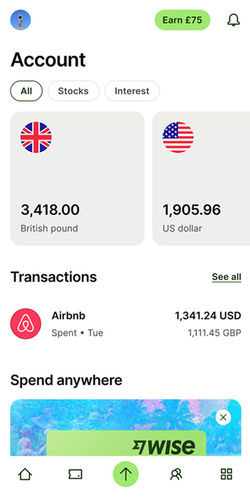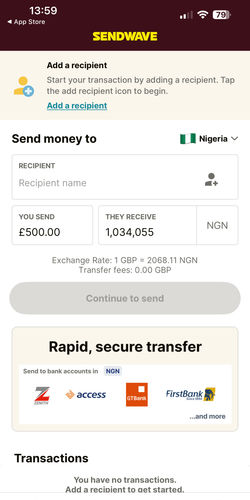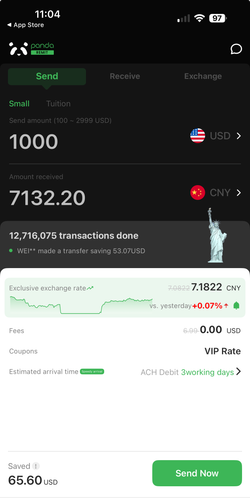The best, fastest & cheapest ways to send money to Pakistan
Compare money transfer services and find the cheapest and easiest ways to make money transfers to Pakistan.
Learn how to secure the best PKR exchange rates at the lowest transfer fees, ensuring a smooth and easy transfer process.
If you just need the best service for PKR transfers, it is Wise. Out of 9 companies tested that support PKR, they appeared 100% of the time as the top-rated provider in our comparisons.
Otherwise, keep reading for expert tips, top PKR transfer deals, and everything you need to know about transferring money to Pakistan.
Send money to Pakistan
"Over 16 million customers use Wise, mostly for their excellent mobile app, transparent fee structure & use of mid-market rates. Now increasingly used for larger transfers."
"Over 16 million customers use Wise, mostly for their excellent mobile app, transparent fee structure & use of mid-market rates. Now increasingly used for larger transfers."
"Over 16 million customers use Wise, mostly for their excellent mobile app, transparent fee structure & use of mid-market rates. Now increasingly used for larger transfers."
"Xe has over 30 years of currency exchange experience, and is one of the most reputable names on the market. 200 countries, 100 currencies, & funds often received in seconds."
"Xe has over 30 years of currency exchange experience, and is one of the most reputable names on the market. 200 countries, 100 currencies, & funds often received in seconds."
"Xe has over 30 years of currency exchange experience, and is one of the most reputable names on the market. 200 countries, 100 currencies, & funds often received in seconds."
"Over 16 million customers use Wise, mostly for their excellent mobile app, transparent fee structure & use of mid-market rates. Now increasingly used for larger transfers."
"Over 16 million customers use Wise, mostly for their excellent mobile app, transparent fee structure & use of mid-market rates. Now increasingly used for larger transfers."
"Over 16 million customers use Wise, mostly for their excellent mobile app, transparent fee structure & use of mid-market rates. Now increasingly used for larger transfers."
"24/7 live chat support provided in six languages. Special first transfer rates available, with airtime topup supported to many countries in Africa, Asia and South America."
"24/7 live chat support provided in six languages. Special first transfer rates available, with airtime topup supported to many countries in Africa, Asia and South America."
"24/7 live chat support provided in six languages. Special first transfer rates available, with airtime topup supported to many countries in Africa, Asia and South America."
"Xe has over 30 years of currency exchange experience, and is one of the most reputable names on the market. 200 countries, 100 currencies, & funds often received in seconds."
"Xe has over 30 years of currency exchange experience, and is one of the most reputable names on the market. 200 countries, 100 currencies, & funds often received in seconds."
"Xe has over 30 years of currency exchange experience, and is one of the most reputable names on the market. 200 countries, 100 currencies, & funds often received in seconds."
"OFX have been helping individuals and businesses send money for over 25 years. Transfer in 50+ currencies to 170+ countries, with 24/7 phone access to currency experts."
"OFX have been helping individuals and businesses send money for over 25 years. Transfer in 50+ currencies to 170+ countries, with 24/7 phone access to currency experts."
"OFX have been helping individuals and businesses send money for over 25 years. Transfer in 50+ currencies to 170+ countries, with 24/7 phone access to currency experts."
"Xoom, a PayPal service, allows you to send money in more than 160 countries. You can send cash for over-the-counter pickup or home delivery, as well as send by bank transfer or debit card."
"Xoom, a PayPal service, allows you to send money in more than 160 countries. You can send cash for over-the-counter pickup or home delivery, as well as send by bank transfer or debit card."
"Xoom, a PayPal service, allows you to send money in more than 160 countries. You can send cash for over-the-counter pickup or home delivery, as well as send by bank transfer or debit card."
"Sendwave is trusted by over 1 million users across the US, UK, Canada and EU. 24/7 support is available online and via the app."
"Sendwave is trusted by over 1 million users across the US, UK, Canada and EU. 24/7 support is available online and via the app."
"Sendwave is trusted by over 1 million users across the US, UK, Canada and EU. 24/7 support is available online and via the app."
"Send money to over 40 destinations online and in the mobile app."
"Send money to over 40 destinations online and in the mobile app."
"Send money to over 40 destinations online and in the mobile app."
"Paysend has transparent fees and rates, with transfer sent within seconds to your recipient's bank. They also have global 24/7 support for any enquiries, and bank-level security."
"Paysend has transparent fees and rates, with transfer sent within seconds to your recipient's bank. They also have global 24/7 support for any enquiries, and bank-level security."
"Paysend has transparent fees and rates, with transfer sent within seconds to your recipient's bank. They also have global 24/7 support for any enquiries, and bank-level security."
"Moneygram is a well established service with over 80 years in the sector. They support over 200 countries worldwide and have over 440,000 retail locations."
"Moneygram is a well established service with over 80 years in the sector. They support over 200 countries worldwide and have over 440,000 retail locations."
"Moneygram is a well established service with over 80 years in the sector. They support over 200 countries worldwide and have over 440,000 retail locations."
How to send money to Pakistan with the best rate
Always compare rates
Don't pay more than you have to. Use our live comparison tool to make sure you aren't missing the best rates when sending money to Pakistan.
Choose a provider
Select the provider that offers you the most PKR and fits your needs.
Click, sign up & send
Follow the steps & make your transfer. Your funds will soon be on their way to your chosen country & currency.
Overall best choice: Wise
We tested & reviewed 9 companies offering transfers to Pakistan, and Wise scored the highest.
Wise offers the best combination of transfer fees, rates, speed, and has the best overall experience for transfers to Pakistan.
At the moment, if you were to send $7,000 to PKR, it would cost you $45.79 in fees, and your recipient will get 1,944,570.97 PKR.

Sendwave is the cheapest way to send money to Pakistan
Sendwave charges $0 per transfer and adds a -1.8% markup on top of the Pakistan Rupee exchange rate.
bank transfer is the cheapest funding option when sending money to Pakistan. Pair it together with Sendwave, to get the most out of your PKR transfer.

Panda Remit is the fastest way to send money to Pakistan
With Panda Remit, the transfer time to Pakistan is minutes - 24 hours.
charges $4 and adds a markup of 0.3% on top of the PKR exchange rate. This is 0% cheaper than the next best option as of February 2026.
For the best combination of speed and cost, we recommend using a to fund your transfer to Pakistan.
*This is based on a $7,000 transfer to Pakistan.

Wise is the easiest way to send money to Pakistan
Wise is very transparent with its fees, charging $45.79 and 0.19% markup on PKR transfers.
They offer multiple deposit options, have good customer service, and take less than 5 minutes to get started with.

Consider this before sending money to Pakistan
Pakistan is one of the top remittance destinations globally, with millions of people relying on regular transfers from family and friends abroad.
Choosing the right provider can save money, deliver faster service, and ensure reliability.
Our analysis of 9 money transfer companies found that:
Sendwave is the cheapest
Panda Remit ranked fastest most often
Sendwave offers the strongest PKR exchange rates
Need to send over $10,000?
For transfers over $10,000, your best bet is Sendwave.
While Sendwave may not always be the cheapest or fastest way to send PKR, but they offer the best exchange rate, years of experience, and will offer you the peace of mind you need when sending large amounts abroad.

Understand the costs of money transfers to Pakistan
The total cost of PKR transfers depends on your location, the amount of PKR sent, the delivery/deposit methods, transfer fees, and the markup applied to the PKR exchange rate.
Transfer fee
The money transfer service you use to send Pakistan Rupee can apply a fixed fee, a percentage-based fee, or a combination of both.
For example, a $7,000 transfer to Pakistan will cost you $0 in fees with Sendwave, based on our February 2026 analysis of 9 services supporting Pakistan Rupee transfers.
PKR exchange rate markup
An exchange rate markup is the percentage added to the mid-market PKR rate.
Using the same example, Sendwave offers the best PKR exchange rates, with a -1.8% markup on the USD-PKR rate. This means for every USD sent, you receive 280.1428 PKR with -1.8% deducted from it.
Deposit method
How you fund your transfer can significantly impact the overall cost.
Bank transfer is the most common option, costing up to $490 per transfer to Pakistan.
Debit card transfers can go as high as $0 in fees, while credit cards are usually more expensive and may include additional cash advance fees.
bank transfer is the cheapest payment method for sending PKR.

Getting the best PKR rate when sending money to Pakistan Rupee
The exchange rate is the value of the Pakistan Rupee (PKR) compared to other currencies. Since it consistently moves up and down, sending at the high will give your receiver more PKR compared to the low.
In the past 7 days, the PKR exchange rate reached:
An average rate of 279.4973 Pakistan Rupee per US Dollar
A high of 281.2801 PKR per USD
And a low of 278.7619 PKR per US Dollar
The PKR/USD exchange rate has seen some movements. Making a transfer when the rate is close to 281.2801 PKR/USD will result in more PKR received.
Wise is our top recommendation for sending Pakistan Rupee, offering a markup of 0.19% which is 0% better than the next cheapest option.
Get notified when it’s the best time to transfer Pakistan Rupees
Sign up for our rate alerts, and we’ll notify you when it’s the best time to send PKR!
Payment methods available for money transfers to Pakistan
The way you fund your transfer to Pakistan will impact the speed, cost, and amount of PKR your recipient receives.
Bank transfers
Bank transfer deposits are a common and reliable funding method for sending PKR, offered by most services covering Pakistan.
While bank transfers are typically more affordable, it may take up to 3 business days for the PKR to arrive in Pakistan.
In our testing of 9 providers, Sendwave appeared as the cheapest option for bank transfers to Pakistan, charging $0 per transfer with a -1.8% markup (1.99% cheaper than the next cheapest money transfer company).
Avoid using wire transfers to Pakistan over the SWIFT network, as they are slower and more expensive due to the bank intermediaries on the way to Pakistan. Instead, choose ACH or your local network option.

Credit cards
A credit card deposit is another option for PKR transfers.
Based on our comparison of 9 companies serving Pakistan, there are a few available options.
To get the best deal, we as CC transfer fees and rates can vary a lot depending on where you are.
CC deposits are usually more expensive when sending Pakistan Rupee, so if you can, opt for a bank transfer deposit or a debit card deposit.
Money transfer to Pakistan is an international transaction.
Your credit card company may apply a cash advance fee and higher interest rates for international payments to Pakistan. We recommend avoiding credit cards when sending money to Pakistan.

Debit and prepaid cards
Debit cards are typically faster but more expensive than bank deposits, with most PKR transfers completed within a few hours.
We recommend using Xe for debit or prepaid card deposits.
With Xe, you’ll pay a 0.68% markup on the PKR rate and $0 in fees when depositing money via the card. This is 0.22% cheaper than using the next cheapest option for transferring money to Pakistan.

How we analyze the market
We track the cost, speed, and product offerings of the leading money transfer services available in Pakistan.
Our comparison engine and algorithms evaluate providers based on over 25 factors, including transfer fees, ease of use, exchange rates, mobile apps, transfer times & customer support.
We also consider how these services are rated on platforms like TrustPilot, AppStore, and Google Play, giving you a comprehensive view of what to expect.
This thorough analysis helps you get the best available deal - every time you want to move money to Pakistan.
We also provide unbiased and detailed reviews of all the top money transfer companies. You can use these reviews to find the best service for your needs when sending money to Pakistan
For a deeper understanding of our commitment to integrity and transparency, we invite you to read our editorial policy and review methodology.

Related transfer routes
Send money from Pakistan
Send money to Pakistan
FAQs
Find answers to the most common questions on our dedicated FAQ page.
How much money can I transfer to Pakistan, and are there any limits?
Are there tax implications when sending funds to Pakistan?
What are the typical fees and exchange rates for sending PKR?
How long will it take for my money to reach Pakistan?
Can I schedule regular PKR transfers?
What currency is used in Pakistan?
Can I send PKR from any country?
How can I track my money transfer to Pakistan, and what should I do if something goes wrong?
Is it better to use my bank for PKR transfers?
Can I use MoneyTransfers.com to money transfers?
Tools & resources
Contributors


















